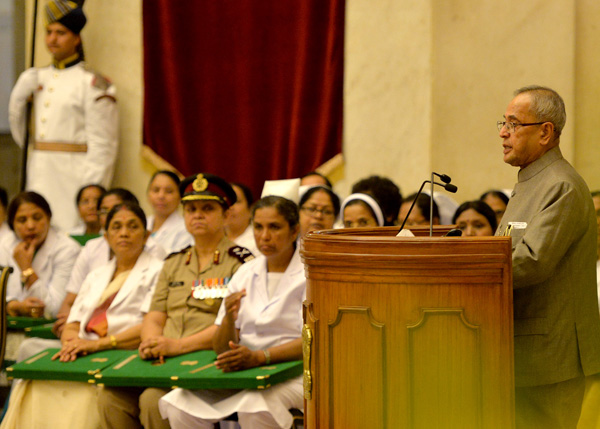
1. It gives me immense pleasure in greeting all on International Nurses’ Day. I extend to you – and through you, to the members of the nursing profession in India, my warm greetings and felicitations.
2. At the very outset, I would like to offer my congratulations to the thirty five outstanding men and women who have been conferred the National Florence Nightingale Awards for the year 2014. They have distinguished themselves through their exceptional service and extraordinary dedication in the care of the sick and the infirm. They have brought credit to a vocation that is chosen by the most selfless and compassionate among us. In recognizing them, we pay tribute to the entire corps of nursing personnel in India.
Ladies and Gentlemen,
3. In the 6th Century BC, Sushruta, who is remembered today as the "Father of Surgery” in India had written, "The Physician, the patient, the drugs and the nurse are the four feet or ‘padas’ of medicine, upon which the cure depends”. It is, indeed, interesting that the first nursing school in India, established in 250 B. C. by Acharya Charaka, one of the principal contributors to the ancient science of ayurveda, had admitted only male nurses. If we look at the chronology of modern nursing in India, we will see that in the mid-1600s , a military hospital in Kolkata , run by the East India Company had to send for nurses from a hospital in London. About two centuries later, in 1865, Florence Nightingale, drew up the detailed "Suggestions on a system of nursing for hospitals in India”. It was her insight that guided the reform of nursing and set new parameters and precedence, creating a model that is still followed all over the world. Her birth anniversary, the 12th of May is aptly commemorated as International Nurses’ Day. Just around the same time, in 1867, it is recorded that St. Stephens’ Hospital in New Delhi opened the first nurses’ training school for Indian women. Not till 1946 did India have a 4-year Bachelors Degree course in nursing –offered by the College of Nursing in Delhi and also in Vellore. After India’s independence, a Master’s Degree course was started in 1960, at the Rajkumari Amrit Kaur College of Nursing in New Delhi. The nursing profession in India has certainly come a long way since then.
Ladies and Gentlemen,
4. Today, nurses are the largest workforce in the healthcare industry in India. Nursing services and capacity building have expanded considerably since Independence and their roles and responsibilities have multiplied over the years. The theme selected by the International Council of Nurses, "Nurses: A force for change – A vital resource for health”, is quite appropriate. The Council has rightly recommended that the nursing workforce in India can be an instrument of change - through better workforce planning, improvement in its education and work environment and through a constructive process of assessing and addressing the nursing workload.
5. India’s healthcare industry today is worth more than 45 billion dollars. It, however, accounts for less that 1% of the global healthcare industry – even though it serves about 17% of the world population. The strength of nurses in India is currently 0.8 nurses per 1000 citizens. This, compared to the world average of 3 nurses per 1000 is quite low. To come closer to the world average, our healthcare system would need to add about 2 million more nurses to its numbers. Presently, we are graduating about 180,000 trained nurses annually. At this rate, it would probably take decades for India to reach the 2 million figure. Despite this prognosis, there is much that we can do to reform and upgrade our capacities. Nurses in India can definitively participate in strengthening the current nursing framework in India. As trainers and system innovators, they can do much to develop better methods and educate the communities in which they live and work. I would emphasise that given India’s broader national goals in healthcare reform, the nursing fraternity would need to go even further – by substantively contributing to policy development - and ensuring that it evolves in the right direction – responding to the needs of our diverse communities. I would encourage them to involve themselves in reviewing and re-modelling practices, modernising methods and rising to the challenges. They must expand their vision.
6. Government of India has taken a number of steps to facilitate reform in the nursing sector. These include opening of nursing colleges, strengthening and upgrading of existing schools of nursing and creating new models for nursing and para-medical education. Government’s efforts to amend outdated regulations and policies are intended to support the efforts and initiatives of nursing associations and organisations like the Nursing Council of India and afford them opportunities as well as facilities to evolve and improve in every way.
7. Today, our nursing fraternity - in the Government sector as well as the private sector, has directly and indirectly helped in implementing important health and family welfare programmes of the Government of India. They have applied their skills - and strictly followed the highest standards of discipline - to enhance their ability to give the finest quality healthcare. It is no wonder that they have earned goodwill and admiration all over the world for their efficiency and commitment. I congratulate them.
8. The awards conferred today are a fitting acknowledgment of your contribution. The nation salutes you as it honours you today. I would like to convey to you the gratitude of the people of India and offer you my best wishes for your good work in the years ahead.
Thank you
Jaihind !
